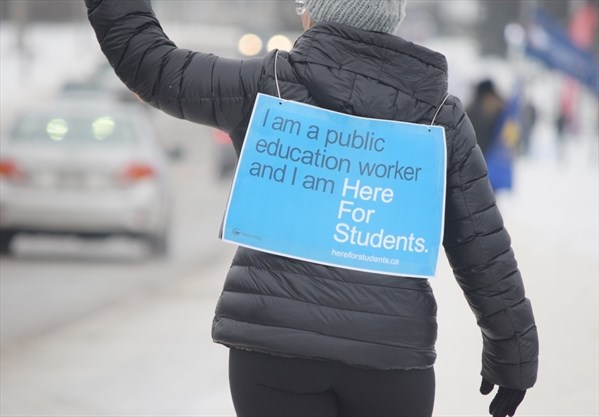Teachers, principals, and their unions have a hard job to do.
It’s the same story year after year. Educators, who are already stretched too thin are being asked to do more with less. For more experienced educators who have gone through numerous strikes, they believe that the education reforms proposed will:
- Increase classroom sizes
- Lead to layoffs of much-needed teachers
- Lead to additional budget cuts
- Allow fewer provisions for special needs students
- Create an unsustainable workloads for educators
The Rise in Educator Stress, Depression, and Anxiety
For years and sometimes even decades, educators have silently shouldered the immense pressure they have at work, despite the physical, mental, and emotional toll it has on them.
Currently, teachers tie with nurses when it comes to stress levels, with 46% reporting high levels on a daily basis. Not only are they responsible for teaching students with different learning abilities and needs, but they are also charged with managing student behaviour, handling verbal abuse, and preventing classroom violence.
Krista Ten Brinke, an educator had this to say about teachers:
“We are asked to wear so many different hats and be so many things for students and their parents: an educator, counsellor, parent, coach, babysitter, cheerleader, event planner, entertainer, and mediator. It can be a lot for one person to take on.”
The Psychological Effects of Strikes on Educators
While job action is primarily perceived as a legitimate means of encouraging dialogue and progress between governments and educators, research has shown that strikes can also have adverse effects on those involved.
Starling Minds has been at the forefront of treating teachers, with over a decade of experience treating educators with prolonged levels of depression, stress, and anxiety.
Emotional State
Dr. Andrew Miki, Registered Psychologist and Chief Science Officer at Starling Minds has learned that educators often struggle with job action and confrontations a lot more than other professions due to their conscientious nature.
“Strikes and job actions can have a profoundly negative effect on teachers as it’s all about confrontation and uncertainty, which goes completely against their nature. They are naturally altruistic and nurturing; who want to make a difference in their students’ lives, their education, and school. Strikes are especially hard due to public perception. Many think educators just want more salary and have an easy job. Educators really take that criticism to heart.” – Dr. Andrew Miki, Starling’s Chief Science Officer
Energy Levels
Depending on the stressors educators have in their lives, and how much energy they preserve, they’ll fall somewhere on the mental health continuum between healthy and unhealthy. Like a battery, when their energy levels deplete, they will experience a higher risk of becoming mentally unwell. Considering also the size and duration of a strike, it may take years for educators to recover from job action, due to the amount of additional stress they’ve experienced. Dr. Miki adds,
“What people don’t realize is that a teacher’s battery has depleted so much during the school year that a strike could be the event that pushes them over emotionally and mentally. In some cases, it could take educators 3 – 4 years to recover from the effects of job action; especially when strikes are taking place in the summer, a time teachers traditionally use to recharge their battery.”
Mental Well-Being
While many workplaces can afford to give their employees ‘mental health days’, the same cannot be said about educators as most school boards haven’t provided that as an option.
“We’re so focused on promoting an environment of mental health and well-being for our students, that we tend to neglect to do the same for ourselves.” – Krista Brinke, School Teacher
According to Dr. Jane Fowler, an industrial-organizational psychologist, she shares the same sentiment around strikes and the impact it has on workers.
“[Higher levels of stress] is not surprising when you think about the financial concerns, changing relationships and roles, and uncertainty about outcomes that occur during a strike.” – Dr. Jane Fowler, Psychologist
The Impact of Strikes on Students
Students are also feeling the impact of the ongoing strikes and are rallying behind their teachers. For students still in their junior years, they are worried that beloved programs such as art and drama will be part of the cuts.
“I am worried with the increasing class sizes and courses [my sister] will miss out on programs because of the cutbacks. Currently her school has lost many valuable courses that students truly love. I fear that she will be forced to go through high school and not truly love it because of the cuts and loss of such loved student courses.” — Student, Grade 12
For students in their senior year, the impacts of the strikes and cutbacks can have a lasting effect on their futures. Across the province, senior students are struggling to prepare for their exams, a crucial part of what universities look at during application reviews.
“The strikes during exams are of course everyone’s biggest worry at the moment. These years are critical and matter a lot for the future. I’m really nervous for the future. It’s not far and it’s pretty scary.” — Student, Grade 12
E-learning has been proposed as an alternative option during the strikes, however many students find that approach fails to address students who learn differently. In classes, teachers can adapt to their teaching styles for the kids. E-learning has a much harder time doing this.
How Unions can help Educators
Fowler’s study did find that educators who were more involved with their unions reported considerably lower levels of depression and anxiety, as a result of the social contact available and sense of being part of a collective.
By encouraging active educator participation during strikes, unions can proactively minimize the adverse effects by:
- Preparing their educators psychologically for the strike
- Providing educators practical support in terms of financial assistance
- Giving educators access to evidence-based online mental health tools
A Trailblazer in Education
British Columbia Teachers’ Federation (BCTF) is a trailblazer in their approach to mental health and wellness. Since 2014, the BCTF has offered Starling Minds, an online mental health and wellness tool designed specifically for educator stressors, backed by years of clinical experience, and evidence-based strategies. With his vision and experience, Dr. Miki adds,
“The platform helps educators assess, monitor, and improve their mental fitness, anytime and anywhere. It’s especially important to use during strikes and job action periods. It not only helps educators build the skills they need to be resilient and mentally healthy, but it also fosters a sense of community in educators who are going through the same thing.”
Educators who used Starling as a mental health tool agree:
“With Starling, I know that I am not alone and that there are tools to help. I have really enjoyed this course. Thank you.”
“These are the tools I’ve desperately needed for my mental health. I have already been practicing some of these through the program and the thought balancer, in my journal writing, and it is really such a relief!”
“I feel like I’m understanding how I actually do have control of my feelings and stress levels and now need to work on changing negative thought pathways. THANK YOU for helping me learn how to get back in charge of my brain.”
A Platform for Every Educator
Starling Minds’ platform has programs to target every educator’s needs. Whether they are looking to build a more resilient mind, are at-work and struggling, or are currently on stress leave, Starling Minds is here.
- Starling Mental Fitness Program is designed for educators who are looking to build resilience to stress, anxiety, and depression to better manage growing stressors in the profession
- Starling Return-To-Health Program supports an educator’s rehabilitation and reduces anxiety when they are confident to return
Summary
Unions play a crucial role in arming educators with the guidance and support they’ll need to carry them through the tough hurdles of strikes. By offering supportive and proven mental health tools like Starling Minds to manage their stressors, unions can proactively minimize the adverse effects job actions have on members now, and in the future.
Learn why education unions and associations chose Starling as their mental health platform by getting in touch with us – we’d love to talk.




